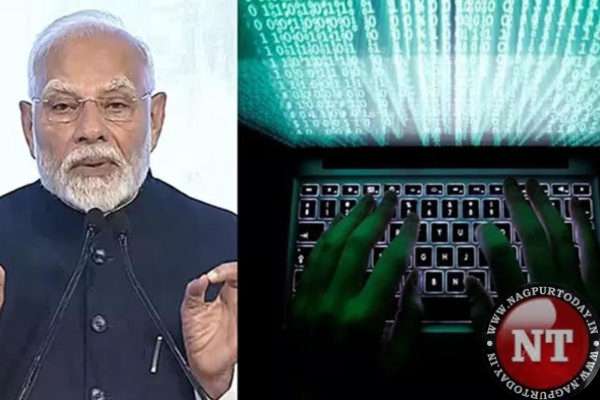
Nagpur: The alarming surge in ‘digital arrest’ scam drew the attention of Prime Minister Narendra Modi. During an episode of his radio programme Mann Ki Baat on Sunday, October 27, the Prime Minister spoke about “digital arrests”, warning people against the scam. “Beware of digital arrest frauds. There is no system like digital arrest under the law. No government agency will ever contact you via phone or video call for such an investigation,” he said.
The PM also said in his address, “The fraudsters impersonate police, CBI, narcotics and at times RBI officials. Using such various labels, they converse as fake officers with a lot of confidence”. PM Modi also said in his address, “Follow these 3 steps to stay safe: Stop, Think, Take Action. First, stay calm and do not panic. Record or take a screen recording if possible. Second, remember that no government agency will threaten you online. Third, take action by dialling 1930 to connect with the national cyber helpline and also inform police about such a crime.”
Notably, Nagpur Today on September 13 published a report titled: “Be alert: Nagpur Cyber Police warn citizens of surge in ‘digital arrest’ scam” in which it was reported that the Cyber Cell of Nagpur Police has issued a warning to citizens regarding a rising trend of cyber frauds involving a new tactic known as ‘digital arrest.’ In this scheme, cyber criminals impersonate law enforcement officials and target unsuspecting individuals, leveraging fear and intimidation to extort money.
According to Cyber Police, these criminals typically pose as police officers or officials from enforcement agencies such as the Enforcement Directorate (ED), Economic Offenders Wing (EOW), or even local police departments. They call citizens claiming that their Aadhaar card, PAN card, or mobile number has been linked to serious criminal activities such as financial fraud or drug trafficking.
What are digital arrest scams?
A digital arrest scam involves scammers pretending to be government officials. They approach potential victims through phone or video calls through WhatsApp, Skype or other channels. Often, the victim is accused of being part of an illegal activity, such as the movement of drugs or a suspicious package.
Through a combination of sets and costumes depicting police stations and official badges, scammers convincingly make their fake identities seem real. They use pressure tactics, intimidation and fake documents to put the victims under so-called digital arrests, demanding that they do not end the call or attempt to even leave their homes.
Following long-duration calls where the consequences of not following their orders are elaborated upon, the scammers demand payments. Money is essentially suggested as a route to secure the victims’ “release” or to end the proceedings.
How to stay safe from digital arrest scam calls:
Scammers lie on victims’ ignorance of the law and create a stressful situation for them, bombarding them with information and making them feel vulnerable. It is not only vulnerable groups who may fall prey to such scams. Vast sums have been stolen from wealthy individuals, as well.
Several signs can reveal whether potential scammers are on the other line of a call. First, they usually discourage sorting out legal issues at a real police station. Second, such calls are of long duration, which is unlikely to happen in a real case. Officials also do not reach out on calls to deal with such matters, as the PM said. Scammers may also ask for Aadhaar or PAN details.
The Indian Cyber Crime Coordination Centre (I4C), is a dedicated wing under the cyber and information security division of the Union Ministry of Home Affairs, mandated to tackle burgeoning cybercrime cases. In its analysis of trends seen from January to April 2024, the I4C found that Indians lost Rs 120.30 crore because of this type of scam.
It has blocked more than 1,000 Skype IDs linked to such activities, after collaborating with Microsoft. Awareness campaigns have also been launched. PM Modi also asked schools and colleges to help spread more information about the issue.
People who receive such calls should immediately report the incident on the cybercrime helpline 1930, or at http://www.cybercrime.gov.in. They should also file a complaint and inform the local police.

























